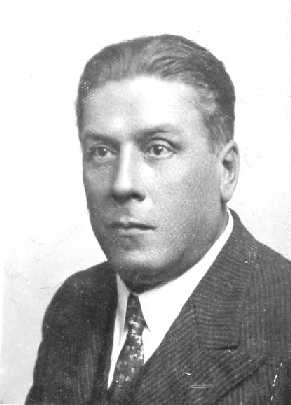<Back to Index>
- Mathematician,
Philosopher and Logician Stanisław Leśniewski,
1886
PAGE SPONSOR

Stanisław Leśniewski (March 30, 1886 - May 13, 1939) was a Polish mathematician, philosopher and logician.
Leśniewski went to a high school in Irkutsk. Later he
attended lectures by Hans Cornelius at the Ludwig
Maximilian University of Munich and lectures by Wacław
Sierpiński at the Lviv University.
Leśniewski belonged to the first generation of the Lwów - Warsaw School of logic founded by Kazimierz Twardowski. Together with Alfred Tarski and Jan Łukasiewicz, he formed the troika which made the University of Warsaw, during the Interbellum, perhaps the most important research center in the world for formal logic.
His main contribution was the construction of three nested formal systems, to which he gave the Greek derived names of protothetic, ontology and mereology. ("Calculus of names" is sometimes used instead of ontology, a term widely employed in metaphysics in a very different sense.) A good textbook presentation of these systems was written by Simons (1987), who compares and contrasts them with the variants of mereology, more popular nowadays, descending from the calculus of individuals of Leonard and Goodman. Simons clarifies something that is very difficult to determine by reading Leśniewski and his students, namely that Polish mereology is a first order theory isomorphic to what is now called classical extensional mereology.
While he did publish a fair body of work, some of it in German, the leading language for mathematics of his day, his writings had limited impact because of their enigmatic style and highly idiosyncratic notation. Leśniewski was also a radical nominalist: he rejected axiomatic set theory at a time when that theory was in full flower. He pointed to Russell's paradox and the like in support of his rejection, and devised his three formal systems as a concrete alternative to set theory. Even though Alfred Tarski was his sole doctoral pupil, Leśniewski nevertheless strongly influenced an entire generation of Polish logicians and mathematicians via his teaching at the University of Warsaw. It is mainly thanks to the writings of his students that Leśniewski's thought is known.
During the Polish - Soviet War of 1919-21, Leśniewski served the cause of Poland's independence by breaking Soviet Russian ciphers for the Polish General Staff's Cipher Bureau.
Leśniewski died suddenly of cancer, shortly before the German invasion of Poland, which resulted in the destruction of his Nachlass.